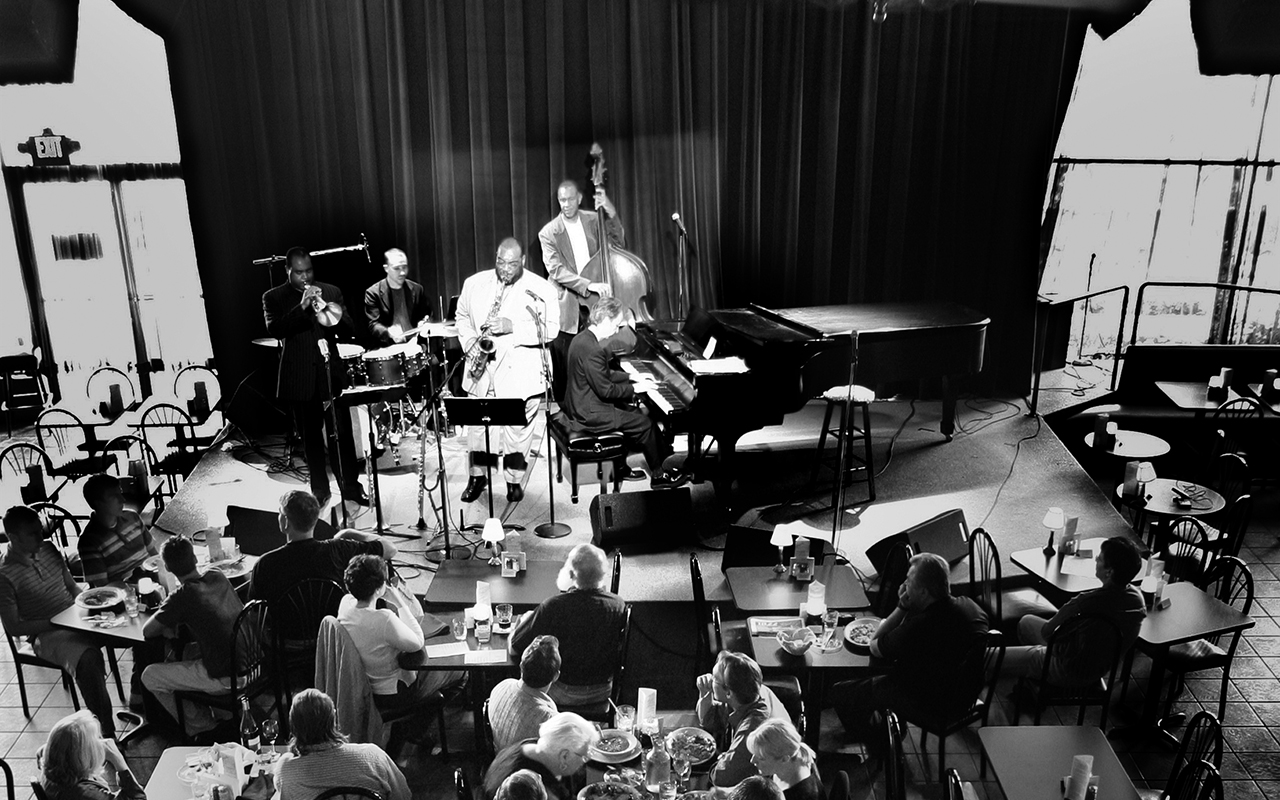
Dimitriou’s Jazz Alley photo courtesy of Jazz Alley
“Are there still tickets to Vieux Farka Touré tonight?” asks the woman ahead of me in the ticket line at Dimitriou’s Jazz Alley. I notice her French accent. She adds that it’s her last night in Seattle and she’s hoping to catch the Malian musician before she heads home to Lyon. She’s in luck, but just barely, as the show is expected to sell out tonight.
Over the past 34 years, Jazz Alley has long-stood as one of the most notable venues on the West Coast. In its time, presenting premiere artists like Dizzy Gillespie, Oscar Peterson, McCoy Tyner, Bill Evans, Brad Mehldau, Betty Carter, Ernestine Anderson and Taj Mahal, Jazz Alley has extended well beyond Seattle’s boundaries. In the case of my international tourist, and many of the artists that tour the globe, Jazz Alley has put the Pacific Northwest on the international live music map.
This September includes Larry Coryell’s 70th birthday celebration, a reunion of the jazz guitar great’s original Eleventh House band; Grammy-winning contemporary jazz guitarist Earl Klugh; Scandinavian/British jazz piano trio Phronesis; and vocalists Jacqui Naylor, Eliane Elias, Meklit Hadero and the winner of the Kobe Sister City Vocal Jazz Queen competition Aki Miyafuji. Annual Jazz Alley performer Taj Mahal says it: “Everybody plays here, you know … that’s anybody.”
Mahal, returning to the Alley for his annual week-long residency around Thanksgiving, has played around the world in a range of venues. He acknowledges and applauds the longevity of Jazz Alley in a video on the venue’s freshly updated website: “To stay in business this long, it takes a lot,” he says.
Owner John Dimitriou credits his club’s success to hard work, good fortune and knowledge gleaned from years of trial and error. The club has continuously evolved, from its grand opening in the University District, to its current location, with free parking, on the corner of 6th Avenue and Lenora Street downtown.
The club features two sets by many performers on weekends and single sets on most weeknights. Dinner or cocktail reservations are recommended. You will find an eclectic assortment of Northwest cuisine on the menu, supporting local organic farmers, fishermen and food producers.
If you’ll be dining, it’s best to arrive at least an hour before the show starts. You can request specific seats if you pay in advance. Otherwise, seating is first come, first served – no matter where you sit, you’ll never be more than 50 feet from the stage.
It’s a cocktail and appetizer night for us. Our group orders the watermelon and feta drizzled with citrus mint oil, and steamed Manila clams with leeks and Andouille sausage. The watermelon and feta is every bit as refreshing as it sounds, and the clams, served in a rich vermouth sauce, do not disappoint. After the plates have been cleared away, I order a Manhattan just as the lights dim and the musicians take the stage.
This evening’s ensemble: Vieux Farka Touré, son of the beloved Malian guitar player Ali Farka Touré. Called “the Hendrix of the Sahara,” in a style similar to his father’s West African “desert blues,” Touré began playing the guitar at age 20. He is joined by Aly Magassa (guitar, vocals), Souleymane Kane (calabash, djembe, vocals) and Mamadou Sidibe (bass guitar). Charming and playful, Touré jokes with the audience throughout the show, at one point asking if he can finish a woman’s dinner in the front row. Near the end of the set, he pauses after the first few chords of a new song to say, “It’s ok, you can stand up. Stand up, stand up!” He coaxes nearly all of us out of our chairs, and we clap in time to the transformative beats. It’s an incredible show.
In the three decades of memorable experiences like this Vieux Farka Touré show, many of the classic jazz musicians that used to play at Jazz Alley have passed away, giving rise to new talent and new interpretations of the genre. In addition to embracing emerging jazz artists, Jazz Alley has expanded to include other genres like world, Latin and country music, an adaptation that has proved resilient in an evolving music scene. But the mission of the family owned and operated business has always been the same – to bring good music and good food to an all-ages audience. “If you make it memorable, they’ll want to come back,” Dimitriou says.